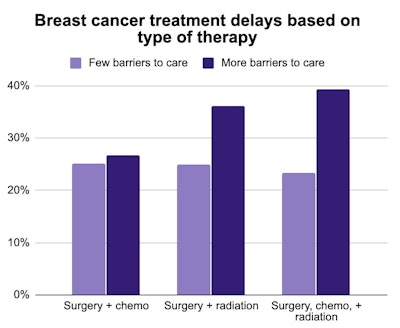
Black women with breast cancer may be more likely to experience treatment delays and longer treatment times than white women, according to the findings of a study published on September 21 in Cancer. This was particularly true for Black women who opted for radiation as part of their treatment.
Researchers from the University of North Carolina (UNC) at Chapel Hill designed the study to better understand why Black women are far more likely to die from breast cancer than white women despite having comparable malignancy rates.
The study of 2,841 women found that Black women may face unique barriers that make them more likely to experience prolonged treatment times. These barriers also appear to have a significant impact on radiation treatments.
"Black women with low [socioeconomic status] and more barriers to care had substantial proportions of prolonged treatment duration, especially when radiation therapy was part of the treatment," wrote the authors, led by Marc Emerson, PhD, from the UNC Gillings School of Global Public Health.
Emerson and colleagues used data from Carolina Breast Cancer Study Phase 3, a population-based study designed to understand disparities in breast cancer care. The study cohort included Black and white women in North Carolina who were diagnosed with breast cancer between 2008 and 2013.
All participants were between the ages of 20 and 74 at the time of diagnosis. The study was designed so that the sample would be approximately half Black and half white, as well as half under the age of 50 and half age 50 and older.
Almost 11% of participants experienced a delay greater than 60 days between diagnosis and treatment, and women with at least one treatment delay were more likely to experience further ones. But treatment delays weren't experienced evenly across the cohort.
| Delayed and prolonged breast cancer treatment by race and age | ||
| Patient demographic | Treatment start date
> 60 days after diagnosis |
Treatment duration
Top 25% of cohort |
| White women | 7.9% | 21.1% |
| Black women | 13% | 29.9% |
| Age 50 or older | 10.7% | 23.8% |
| Age younger than 50 | 10.5% | 27% |
Black women experienced delays and prolonged treatment more often than white women. In addition, young women were more likely than women over the age of 50 to face long treatment times.
These statistics were particularly notable for young, Black women. Nearly one-third of Black women under the age of 50 experienced prolonged treatment duration, compared with 22% of white women the same age. Similarly, 28% of Black women age 50 and older experienced prolonged treatment times, as opposed to 20% of white women.
Socioeconomic status was also linked to treatment delays and longer treatment times, but its effect was less pronounced for Black women than white women. In fact, Black women with high socioeconomic status experienced delayed treatment more often than white women with low socioeconomic status (12% vs. 11%).
In a press release, Emerson stated that these findings underscore "the disparate experience of Black women, who appear to experience unique barriers."

The authors also found women had longer treatment times if their care included radiation. This was particularly true for both Black and white women who faced barriers accessing care.
Women with barriers to care were 1.6% more likely to experience prolonged treatment if they chose chemotherapy and surgery -- but 22% more likely to have delayed treatment for radiation and surgery.
Financial and transportation issues, in particular, were linked to prolonged radiation treatment. Women undergoing radiation and surgery had a 25% greater probability of long treatment times if they faced a transportation barrier and 15% higher probability if of longer treatment if they experienced a financial issue.
Perhaps unsurprisingly, the association between socioeconomic status and prolonged treatment was stronger for Black women. One-third of Black women with low socioeconomic status and 43% of Black women with barriers to care had prolonged treatment. The authors noted this was especially prominent when their care included radiation.



















